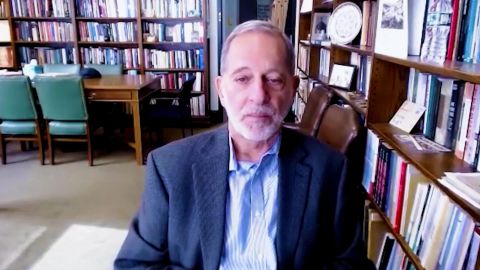Read Transcript EXPAND
CHRISTIANE AMANPOUR, CHIEF INTERNATIONAL ANCHOR: President Biden has left Israel and the region after failing to have that summit with Arab leaders. Let’s go now to Marwan Muasher, who was Jordan’s ambassador to Israel and later Jordan’s foreign minister. Welcome to the program, Marwan.
MARWAN MUASHER, FORMER JORDANIAN FOREIGN MINISTER AND VICE PRESIDENT FOR STUDIES, CARNEGIE ENDOWMENT FOR INTERNATIONAL PEACE: Thank you.
AMANPOUR: Can I ask you, first and foremost, how do you react now to the fact that your king, the president of Egypt, the president of the Palestinian Authority canceled their summit with President Biden because they believed — I assume that’s why, they believed that Israel had struck that Baptist Hospital in Gaza. Was it hasty?
MUASHER: I think, Christiane, public opinion after the hospital attack would not have allowed the summit to take place. The Arab public puts the attack squarely on Israel. And under these circumstances, it would have been extremely difficult for the summit to take place. This is one. I also think that there were no guarantees that the summit would have led to a ceasefire, and the public would have questioned its usefulness because of that. And I think the third reason is that if the Israelis feel that Iran is complicit with Hamas on this attack, then the Arab public also feels there is no daylight between the U.S. administration’s position and that of Israel. They also further feel that there is a process of dehumanization of Palestinians that is going on. When Israeli casualties are there, you feel there’s a lot of empathy by the International Community, but that empathy is lacking when it comes to Palestinians. And under these circumstances I believe it would have been extremely difficult for the summit to take place.
AMANPOUR: Can I just push a little bit further on that? You say, no matter the evidence, and the United States has independently confirmed the evidence, that the Arab street nonetheless doesn’t believe Israel. Is that —
MUASHER: I think there is —
AMANPOUR: Yes. But is that sustainable for the future?
MUASHER: I think, Christiane, there is a need for an independent investigation to take place. I’m not going to say who did it, but there is also strong indications by the other side. For example, that same hospital was targeted by Israeli rockets. Last Saturday, the Archbishop of Canterbury, Justin Welby, who is — of course, whose church is in charge of the hospital, put something on Twitter last Saturday saying that his hospital was bombed and that there were four injuries. Just today, he put another statement, you know, reiterating that fact. So, Palestinian hospital officials also said that they received warnings from the IDF after the first attack to evacuate the hospital. So, I don’t think we can pass judgment before we can see, you know, strong evidence as to who did it. But beyond who did it, Christiane, beyond who did it, this is a prelude to the kind of carnage that we are going to see if Israel invades Gaza. And I’m afraid we might see tens of thousands of casualties if Israel indeed goes in Gaza. That cannot be under Israel’s, you know, right to defend itself. Collective punishment, cutting off water from 2 million Palestinians cannot be condoned or justified in the name of the right to defend itself. That is international law and that should be respected by Israel, you know, to the point.
AMANPOUR: Now, we obviously have spoken to Martin Griffiths, and you might have heard it, there does seem to be an agreement, which, of course, we’re going to be following and watching to see if it comes through to actually start allowing, you know, water and all the rest in. But you’re right, the defense minister called a complete blockade and siege of Gaza last week.
About This Episode EXPAND
Emergency Relief Coordinator for the United Nations joins from Cairo where he has been meeting with Egyptian officials. Jordan’s former Foreign Minister discusses regional reaction and response to Gaza’s hospital bombing. Richard Haass talks about US’s role in mediating this conflict. Historian Rashid Khalidi raises concern over what America’s unwavering support for Israel means for the region.
LEARN MORE

